

Find the unexpected. Saturday Morning Breakfast Cereal. The mind-bending science behind the backwards bicycle. Here's a universal truth we can all depend on: everyone who's been given the opportunity to learn how to ride a bike knows how to do it.

Unit Plan: Teaching the Nature of Science. The First Days Try to open the course with some sort of dramatic "grabber".

This will get their attention, and instantly impress your students that this is not just another "ho-hum" course. (In fact, you should try to do SOMETHING off the wall, dramatic, unusual or unexpected EVERY DAY, so that your students will look forward to being there, everyday, with great anticipation). Two different scenarios are suggested here. They have both been used, with considerable success (as measured by pre/post testing). Scenario A: Illusions 1. Scenario B: Deep Ignorance. You can’t detox your body. It’s a myth. So how do you get healthy? Whether it’s cucumbers splashing into water or models sitting smugly next to a pile of vegetables, it’s tough not to be sucked in by the detox industry.
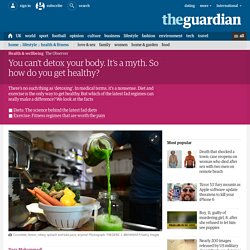
The idea that you can wash away your calorific sins is the perfect antidote to our fast-food lifestyles and alcohol-lubricated social lives. But before you dust off that juicer or take the first tentative steps towards a colonic irrigation clinic, there’s something you should know: detoxing – the idea that you can flush your system of impurities and leave your organs squeaky clean and raring to go – is a scam. It’s a pseudo-medical concept designed to sell you things. How simple ideas lead to scientific discoveries. The simplest questions can carry you to edge of human knowledge, says Adam Savage, as he discusses the incredible scientific discoveries that came from simple, creative methods that anyone could have followed.
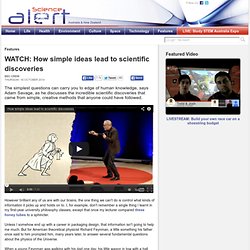
[optional caption text here] Image: [name here]/Shutterstock However brilliant any of us are with our brains, the one thing we can't do is control what kinds of information it picks up and holds on to. I, for example, don't remember a single thing I learnt in my first-year university philosophy classes, except that once my lecturer compared these honey tubes to a sphincter. Unless I somehow end up with a career in packaging design, that information isn't going to help me much. Did screaming babies accompany our early ancestors into battle? Why is the sound of a crying baby so utterly annoying?
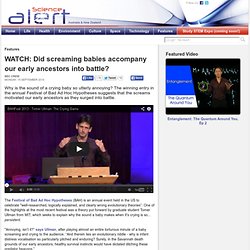
The winning entry in the annual Festival of Bad Ad Hoc Hypotheses suggests that the screams motivated our early ancestors as they surged into battle. The Festival of Bad Ad Hoc Hypotheses (BAH) is an annual event held in the US to celebrate "well-researched, logically explained, and clearly wrong evolutionary theories”. Why Do People Persist in Believing Things That Just Aren't True? Last month, Brendan Nyhan, a professor of political science at Dartmouth, published the results of a study that he and a team of pediatricians and political scientists had been working on for three years.
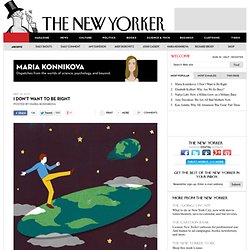
They had followed a group of almost two thousand parents, all of whom had at least one child under the age of seventeen, to test a simple relationship: Could various pro-vaccination campaigns change parental attitudes toward vaccines? Each household received one of four messages: a leaflet from the Centers for Disease Control and Prevention stating that there had been no evidence linking the measles, mumps, and rubella (M.M.R.) vaccine and autism; a leaflet from the Vaccine Information Statement on the dangers of the diseases that the M.M.R. vaccine prevents; photographs of children who had suffered from the diseases; and a dramatic story from a Centers for Disease Control and Prevention about an infant who almost died of measles.
The result was dramatic: a whole lot of nothing. Spurious Correlations. 10 Paradoxes that Will Totally Surprise You. A paradox is a statement that apparently contradicts itself and yet might be true.
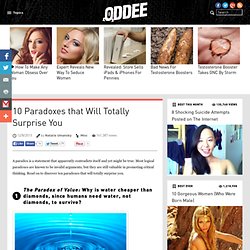
Most logical paradoxes are known to be invalid arguments, but they are still valuable in promoting critical thinking. TAKING SCIENCE ON FAITH. SCIENCE, we are repeatedly told, is the most reliable form of knowledge about the world because it is based on testable hypotheses.
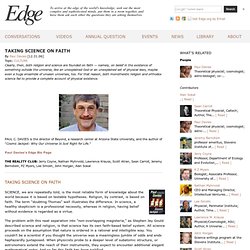
Religion, by contrast, is based on faith. The term "doubting Thomas" well illustrates the difference. In science, a healthy skepticism is a professional necessity, whereas in religion, having belief without evidence is regarded as a virtue. Edge.org. I believe, but cannot prove, that memory is inherent in nature.
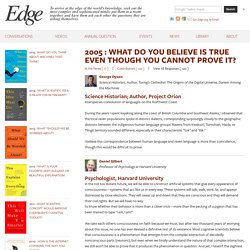
Most of the so-called laws of nature are more like habits. There is no need to suppose that all the laws of nature sprang into being fully formed at the moment of the Big Bang, like a kind of cosmic Napoleonic code, or that they exist in a metaphysical realm beyond time and space. Before the general acceptance of the Big Bang theory in the 1960s, eternal laws seemed to make sense. The universe itself was thought to be eternal and evolution was confined to the biological realm. But we now live in a radically evolutionary universe. If we want to stick to the idea of natural laws, we could say that as nature itself evolves, the laws of nature also evolve, just as human laws evolve over time.
In the Media.